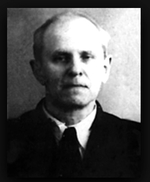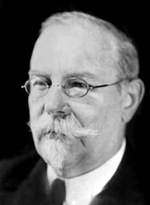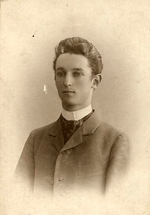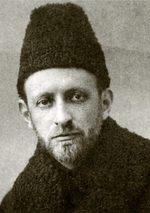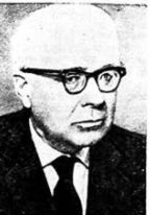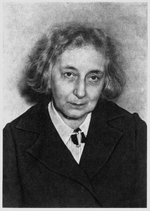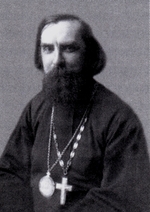Articles
Perepelkin Yury (1903–1982)
Perepelkin Yury (1903–1982) – egyptologist.
He graduated from the Physical and Mathematical Faculty of the Frunze Crimean State University in 1924, and entered the Faculty of Linguistic and Material Culture of the Leningrad State University; he graduated from it in 1927, and entered the post-graduate courses. In 1930, he defended his Candidate thesis in History on epigraphic of the Amarna period of Ancient Egypt.
Since 1927, he worked at the Museum of Paleography of the Ac. of Sc. of the U.S.S.R. (later ut was included into the Institute of the History of Book, Document and Writing), where he studies written monuments of the Ancient World and Early Medieval period from the collection of N. P. Likhachev. He prepared and published a guidebook on the collection ‘Writing of the Ancient World and Early Middle Ages’ (1936; P. was its curator).
Read More
Peretz Vladimir (1870–1935)
Peretz Vladimir (1870–1935) – philologist, paleographer, historian of literature, folklorist, specialist in source studies.
In 1893, he graduated from the St. Petersburg University; in 1896-1903, he worked there as Ass. Docent.
In 1900, he defended his Master thesis, and in 1902 – his Doctor thesis; they were published as series of ‘Historical and Literary Research’ in three volumes.
In 1903, he became Ass. Professor; in 1903-1904, he was Full Professor of the Chair of Russian Language and Literature of the Historical and Philological Faculty of the Kievan St Vladimir University; since 1907, he supervised there the Seminar in Russian Philology. In 1914-1917, he was Professor of the Saratov University; in 1914-1927, he was Ass. Professor of the St. Petersburg/Leningrad University.
Read More
Persitz Mark (1908?‒1986)
Persitz Mark (1908?‒1986) – historian of social thought.
He worked at the Institute of History of the Ac. of Sc. of the U.S.S.R. In 1952, he defended his Candidate thesis in History ‘The Decree of the Soviet of People’s Commissioners of the R.S.F.S.R. from January 23 (February 5), 1918 On the Separation of Church from State and School from Church, and Its Historical Significance’.
He wrote on the topics of Marxist Atheism, as well as other variants of Atheism and struggle for freedom of conscience in Russia.
Read More
Petri Bernhardt (1884–1937)
Petri Bernhardt (1884–1937) – ethnographer, anthropologist.
He was a descendant of Swedish Reformer Olaus (Olaf) Petri; he was born in Bern, in the family of Doctor of Medicine Eduard Julievich Petri (1854-1899), Ass. Docent in Geography and Anthropology of the University of Bern. Elder brother of G. E. Petri, historian-medievalist.
After the K. May Gymnasium in St. Peterburg, he enrolled to the Geographical Department of the Faculty of Natural Studies of the St. Petersburg University, and graduated from it in 1910. He was a disciple of V. V. Radlov. In 1910-1918, he worked at the Museum of Anthropology and Ethnography of the Ac. of Sc.: as a free-lancer< Junior Researcher, and Head of the Department of Australia and Oceania.
Read More
Petri George (Karl Julius) (1888–1942)
Petri George (Karl Julius) (1888–1942) – historian, medievalist.
He was a son of E. J. Petri and a brother of B. E. Petri; he learnt at the K. May Gymnasium in St. Petersburg. In 1907-1912, he studied at the Historical and Philological Faculty of the St. Petersburg University; his supervisor was I. M. Grevs. After the graduation he was invited to the Chair of the World History to prepare himself for a position of Professor. In the spring of 1916, he passed through the Master’s exams.
Since 1913, he worked as gymnasium teacher; in 1925, he started to teach the excursions matter at the Faculty of Language and Material Culture of the Leningrad State University. He taught the excursions matter at various secondary and high schools of Leningrad.
Read More
Petrushevsky Ilya (1898–1977)
Petrushevsky Ilya (1898–1977) – Doctor in History, Professor, outstanding orientalist, specialist in the history of Central Asia, Iran, and Transcaucasia in the Middle Ages and Early Modern Time.
In 1926, he got a diploma and started to work at the Baku University, then at the Tbilisi University; in 1936, he moved to Leningrad. In various years he headed the Chair of the History of the Near East of the Oriental Faculty of the Leningrad State University, worked at the Leningrad Branch of the Institute of History of the Ac. of Sc. of the U.S.S.R., headed a group of Iranic studies at the Leningrad Branch of the Institute of Oriental Studies of the Ac. of Sc. of the U.S.S.R. Many years of studying feudal systems of the Near East and Central Asia shaped his interest for the history of Islam in medieval Iran.
Read More
Pigulevskaya Nina (1894–1970)
Pigulevskaya Nina (1894–1970) – specialist in Semitology and Syriology, historian of the Christian East.
She was from the Gentry family of the Stebnitskys. In 1911, she finished the private gymnasium of M. N. Stoiunina with a golden medal. In 1912, she enrolled the Historical and Philological Faculty of the St. Petersburg Bestuzhev High Female Courses; she graduated from them in 1918. In that period, the main sphere of her interests was shaped: it was the history of the Orthodox East. It demanded serious studies of Oriental languages, which P. got in 1918-1922, at the Oriental Faculty (since 1920 – Faculty of Social Studies) of the Petrograd University, under the supervision of M. N. Sokolov (Old Hebrew language), and A. P. Aliavdin (Syrian language).
Read More
Pisarev Sergey (1902–1969)
Pisarev Sergey (1902–1969) – ethnographer, writer.
Author of novelettes and stories (the first publication in 1923).
In 1930, he graduated from the High Courses of the Art Studies at the Leningrad Institute of the Art History. He worked as actor, as Researcher of the State Russian Museum.
Since 1933, he was Researcher of the Museum of the History of Religion of the Ac. of Sc. of the U.S.S.R. in Leningrad. He participated in expeditions of the Museum to the western districts of the Leningrad Region and to the Russian North. He was a member of the Section on Studying the Religious Beliefs of the peoples of the U.S.S.R. (group of studying religious syncretism) under the leadership of N. M. Matorin.
After the WWII, he taught at various high schools. He died on May 8, 1969, and was buried on the Seraphimovskoe Cemetery in Leningrad/St. Petersburg.
Read More
Platonov Nickolay (1889–1942)
Platonov Nickolay (1889–1942) – priest, bishop of the Renovated Chruch (Obnovlentsy), journalist, curator at the Museum of the History of Religion of the Ac. of Sc. of the U.S.S.R.
In 1914, he graduated from the St. Petersburg Spiritual Academy, defended his Master thesis; since 1915, he taught at the St. Petersburg Spiritual Seminary; since 1924 – at the Leningrad High Theological Institute. Since 1922, he served as prior of the St Andrew Cathedral in Leningrad; in 1923-1924 – of the St Isaac Cathedral. In 1923, he joined the Renovated Movement (Obnovlentsy). In 1924, he was commissioner of the All-Russian Renovated Synod of the Leningrad Eparchy; later – a member of its Presidium.
Read More
Platonov Sergey (1860–1933)
Platonov Sergey (1860–1933) – historian.
Correspondent member of the Ac. of Sc. at the Historical and Philological Department (Russian history and antiquities) – since 1909; Academician 0 since 1920. In 1899, he became Professor of the St. Petersburg Universityl in 1918-1929, he was Chairman of the Archeographic Committee of the Ac. of Sc.; in 1925-1929 – Director of the Institute of Russian Literature (Pushkinsky Dom) of the Ac. of Sc. of the U.S.S.R; and in 1925-1928 – Director of the Library of the Ac. of Sc.
He was arrested on January 12, 1930 in the frames of the ‘Academic affair’. On August 8, 1931, he was sentenced to five years of exile; he was sent to Samara, where he died. He was excluded from the Ac. of Sc. on February 2, 1931; restores on April 5, 1968; rehabilitated.
Read More
Showing 211-220 of 351 items.

